
|   |

|   |
Spectacular presentation of Meenakshi Kalyanam - Vijay Shanker e-mail: Vijaydance@gmail.com May 10, 2023 Hari Hara Arts Academy presented their latest dance drama 'Meenakshi Kalyanam' in the Kuchipudi Bhagavata Mela Natakam traditional style with the participation of about thirty five artistes at the Vishaga Children's Theatre auditorium in Visakhapatnam on 23rd April. This spectacular presentation of the story of the goddess Meenakshi was noteworthy for its exquisite costumes, dramatisation of various scenes, melodious music and articulate performances by all the performers. In the duration of two and half hours, the audience was taken into a different world of musical and dance journey, creating a mystical impact with the final darshan of the goddess Meenakshi. Concept, choreography and direction were by Prof Pasumarthy Ramalinga Sastry, veteran Kuchipudi mentor, choreographer and scholar. The programme was organised by Balaji Educational Institutions and Elite Company. 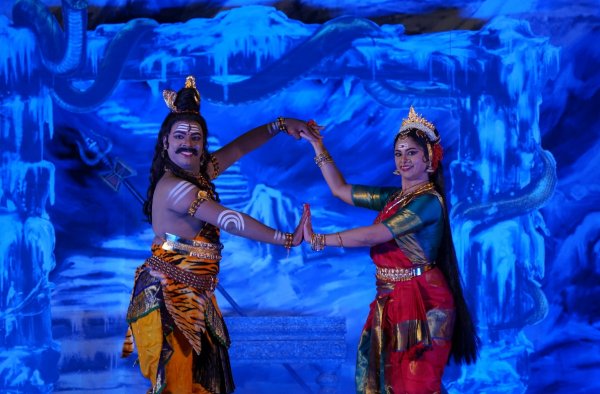 Joyous dance of Shiva and Parvati 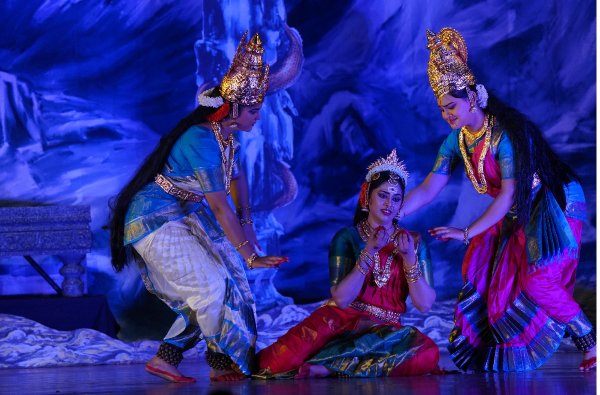 Parvati after being cursed by Shiva After the traditional invocations to goddess Amba and Lord Ganesha, 'Meenakshi Kalyanam' commences with the scene of the joyous dance of Lord Shiva in Kailasa with Parvati in the presence of all the gods and ganas. Lord Brahma maintains the rhythm, Krishna plays the flute, and Nandi plays the mridangam. In the climax, the earring of Lord Shiva falls and he cleverly picks it up with his toes and strikes a pose. In the process the harmony of the dance is a little disturbed, hence Parvati is enraged and accuses him of not paying proper attention, in spite of having three eyes. Shiva is enraged and curses Parvati that she will be born on earth as a woman with three breasts. Meanwhile Pandya King Malayadwaja and queen Kanchanamala are quite perturbed as they do not have any children. With the suggestion of sage Agastya Muni the king decides to organise a Yagna in order to be blessed with a child. The king is blessed with a girl child named Tadadagai who becomes adept in sixty four art forms, including martial arts. The king is quite impressed and decides to give her the throne but the subordinate kings would not approve, so Tadadagai cleverly defeats the Samanta Raja, King Indra, Vayu and Agni and finally meets Lord Shiva. She recollects her past and regains her position as the original goddess Meenakshi and marries Shiva. After the kalyanam, the scene in Madurai of the goddess Meenakshi with the backdrop of Ashta Gajas (eight elephants) that adorn the temple creates a magical impact on the audience that is treated to a wonderful spectacle and 'darshan' of the goddess. Besides the powerful display of the dramatic sequences, vachika abhinaya - speech and dialogues - are used in Telugu wherever necessary, enhancing the interpretation of the story. The complete involvement of all the characters, whether big or small, coupled with appropriate and brilliant dance performances makes this presentation unique and worth watching again. Such productions have to be presented to global audiences. 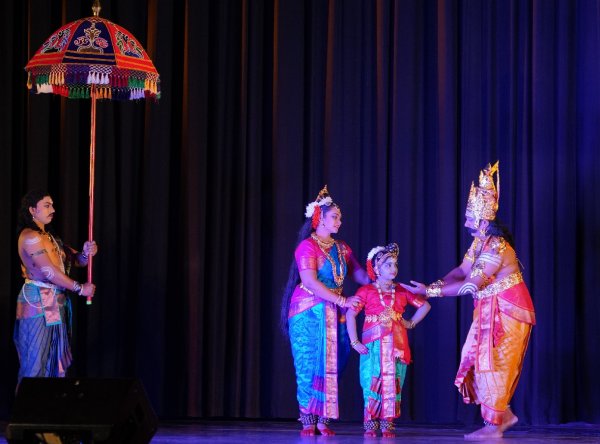 Young Meenakshi 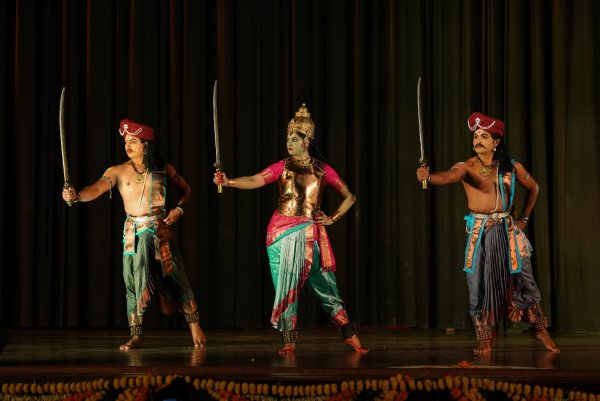 Meenakshi as an expert in martial arts The role of Meenakshi, Parvathy and Tadadagai was brilliantly executed with elegance and poise by Saujanya Srinivas, Shiva and Sundareshwara was immaculately displayed by powerful dancing by Subbaraja, Pandya Raja by Ajay Chakravarti and Kanchanamala by Sweta was impressive. Samanta Raja was played by Surendranath, Baby Meenakshi by Revathi. The Sutradhars were played by Prakhya, Surendranath, Vishwanath, Sushma, Sushmita and Aiswarya. Mohan as Vishnu was superb; Saraswati by Sweta and Lakshmi by Meghana; Brungi by Sagar; Rishi by Hari Mangalampally, Suresh and Pavan; Nandi by Natasai; Agastya by Narasingh and Varuna by Hari. The wonderful musical score and singing was by DSV Sastry and the female singer was Pasumarthy Padma. On the whole, it was a spectacular presentation. The compere for the evening was the veteran dramatist Murali Krishna. 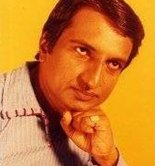 Vijay Shankar is a Kuchipudi and Kathakali exponent, teacher, bilingual journalist, arts critic and actor. |